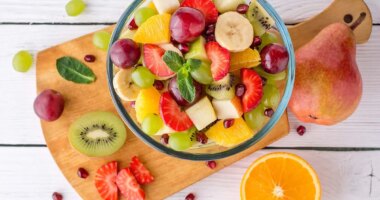Diabetes
oi-Shivangi Karn
on July 11, 2021
Guava (Psidiumguajava Linn.), a widely grown and loved fruit of the monsoon, is known for its numerous medicinal and health benefits. One of the benefits of this superfruit is its anti-diabetic effect which is beneficial in the management and prevention of diabetes.
Not only is the fruit of guava, but also its leaves have a hypoglycemic or glucose-lowering effect and is used in many ways to regulate blood sugar and cholesterol levels of the body.
In this article, we will discuss an association between guava (both fruit and leaves) and diabetes. Take a look and don’t forget to include this sweet and savoury fruit in your diabetes meal plan.
Soybean And Diabetes: Know How It Helps Control Glucose Levels
Nutrition In Guava (Fruit And Leaves)
Guava contains a high amount of ascorbic acid i.e 50-300 mg per 100 g. It contains several carotenoids (a type of antioxidants) such as beta-carotene, lycopene, lutein, gamma-carotene, beta-cryptoxanthin, crypto flavin, rubixanthin and neochrome.
Phenolic compounds such as anthocyanins, myricetin and ellagic acid are also present in high amounts in guava fruit, along with dietary fibre and some of the vital minerals such as iron, calcium, magnesium and phosphorus. [1]
Zika Virus Reported In Pregnant Woman In India: Know Its Causes, Symptoms And Treatments
Guava leaves are also rich sources of many micro-and macronutrients and bioactive compounds. A study has shown that guava leaves contain 18.53 per cent protein, 103 mg of vitamin C and 1717 mg of gallic acid.
Bioactive compounds in guava leaves include quercetin, flavonoids, gallic acid, caffeic acid, ferulic acid, catechin, kaempferol, epicatechin and hyperin, along with polysaccharides and proteins. [2]

Guava Fruit And Diabetes
Many studies have shown that daily consumption of fruits is linked to a reduced risk of diabetes. A study talks about the blood sugar lowering effect of guava fruit in people with diabetes, along with controlling their cholesterol levels, which is the main cause of diabetes-related complications like heart disease.
Guava fruit (without peel) can help manage glucose levels probably due to its:
1. High fibre content
Guava pulp contains a high amount of pectin (a type of dietary fibre) that delays the absorption of glucose by the intestines so that there’s no sudden increase of sugar in the body. This may help improve glucose tolerance and prevent the risk of diabetes or manage the condition. [3]
2. Rich in flavonoids
Guava is rich in flavonoids glycosides, which are compounds with potent antioxidant activities. Some of the vital anti-diabetic flavonoids in guava fruit include strictinin, Isostrictinin and pedunculagin which are helpful in improving insulin sensitivity in the body. Antioxidants help prevent the pancreatic cells from damage by free radicals and thus, improves the production and functioning of insulin. Also, tannic and gallic acid in the fruit has the anti-glycation effect that may help prevent the risk of vascular complications
First Case Of Vertical Penile Fracture Reported In UK Man: All About Penile Fracture
READ RELATED: 12 Health Benefits Of Kaffir Lime Which Will Surprise You
3. Rich concentration of magnesium
Raw guavas have higher levels of magnesium compared to their ripe forms. According to USDA, 100 g of guava contains 22 mg of magnesium. The mineral magnesium plays a great role in regulating insulin and facilitating it to enter into the peripheral tissues, cardiac tissues, skeletal tissue and adipose tissue, so as to decrease the sugar in the blood and thus, manages diabetes. Low intake of magnesium is associated with diabetes risk or its complications. [4]
Note: Some studies say that guava fruit without peel is more effective in managing diabetes compared to guava fruit with peel. Also, raw guava is effective compared to ripe guava.

Guava Leaves And Diabetes
Guava leaves are used as folk medicine in many subtropical areas worldwide. One of the primary benefits of guava leaves is managing diabetes. Though guava leaves have an anti-diabetic effect and are considered safe and effective for people with diabetes, the research is ongoing in the area with more evidence to prove the statement.
1. Reduce post-meal rise of glucose
The aqueous leaf extract of guava or guava leaf tea, prepared by hot water extraction from guava leaves, is composed of ellagic acid, cyanidin and other polyphenols. Upon consumption, it tends to reduce the postprandial or post-meal blood sugar by 37.8 per cent, along with reducing the fasting blood glucose which is beneficial in the management of diabetes. [5]
2. Reduce the risk of diabetes complications
Some studies also say that consumption of guava leaf tea for 5-7 weeks can help improve insulin resistance and reduce the progression of diabetes complications like nephropathy and obesity. [6]
Are Chocolates Good For People With Diabetes?
3. Improve liver and kidney functions
Long term consumption of guava leaves can increase the production of insulin, glucose utilisation by the cells and liver and kidney functions, whose functions may deteriorate due to excess glucose in the body. [7]

How To Prepare Guava Leaves Tea
Ingredients
- 5-7 fresh guava leaves.
- Two cups of water
- Thoroughly wash guava leaves to remove all dirt.
- In a pan, pour the water and bring it to a boil.
- Add the leaves and let them boil for around five minutes on a medium flame.
- You can add half a teaspoon of normal tea leaves to give colour and enhance the taste.
- Lower the heat and let it sit for around 10-12 minutes
- Strain in a cup and consume.
Method
Best Times To Consume Guava
Experts suggest consuming guava tea after every meal to reduce glucose levels. If you are consuming a guava fruit, do not eat on an empty stomach as it is acidic in nature and may increase the acid production in the stomach. Therefore, the best time to consume guava is in between meals. Guava juice is best when consumed with meals.
Note: Pregnant women with diabetes must consume guava tea only after consulting a medical expert.
To Conclude
Enjoy guava before its season ends and get its excellent nutritional benefits.
GET THE BEST BOLDSKY STORIES!
Allow Notifications
You have already subscribed
Story first published: Sunday, July 11, 2021, 8:30 [IST]
Source:







